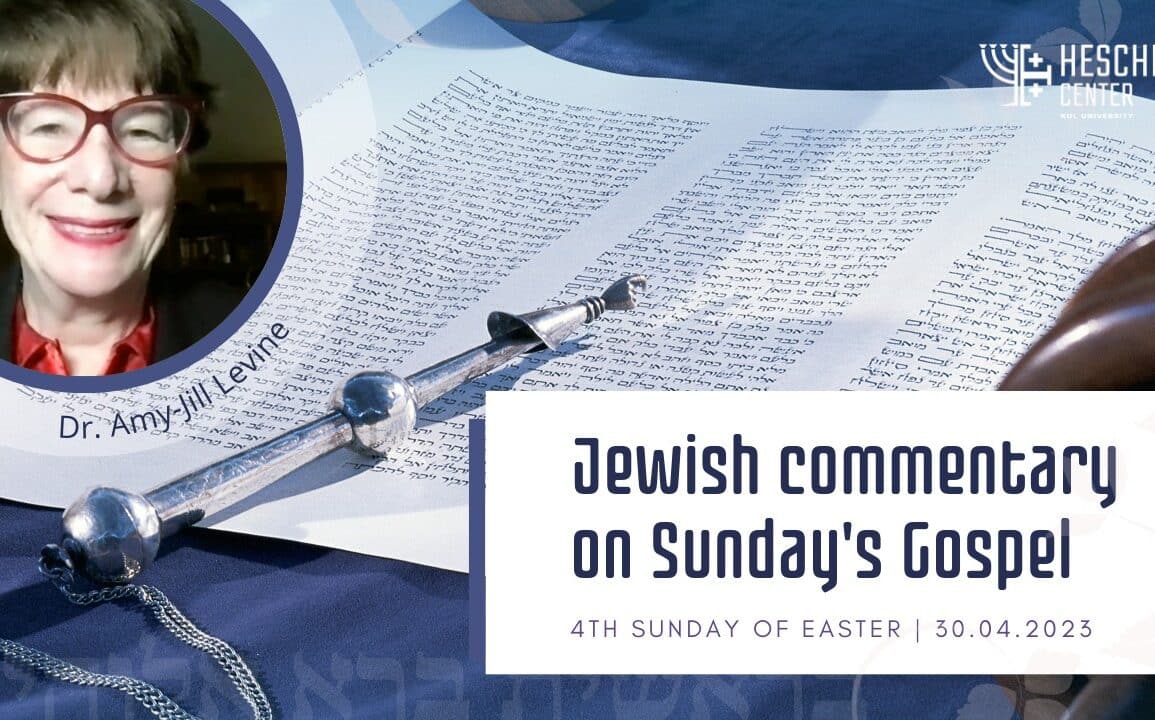As the Second Vatican Council taught, and as the Church teaching continues to affirm, God’s first covenant with the Jews remains in place because God does not break covenants, Dr. Amy-Jill Levine, professor of New Testament and Jewish Studies and the first Jewish woman to teach New Testament at the Pontifical Biblical Institute in Rome, points out in a commentary for Heschel Center of the Catholic University of Lublin.
Dr. Amy-Jill Levine points out that a passage from the reading for the Fourth Sunday of Easter, if not accurately clarified, can instill or reinforce resentment against Jews. There we read the words of Peter the Apostle, “Let the whole house of Israel know for certain that God has made both Lord and Christ, this Jesus whom you crucified” (Acts 2:36).
However, it is important to refer, with all due force, to Nostra Aetate, the Second Vatican Council document on Catholic-Jewish relations promulgated in October 1965, which emphasizes: “what happened in [Jesus’] passion cannot be charged against all the Jews, without distinction, then alive, nor against the Jews of today”. Dr. Amy-Jill Levine explains how, on the basis of Catholic Church teaching, to understand St. Peter’s words correctly.
The full text of the commentary follows:
The lectionary for the 4th Sunday of Easter includes Acts 2.14a, 36-41. This reading, unless carefully explained, will either inculcate or reinforce Jew-hatred.
In Acts 2, Peter addresses, “Men of Judea and all who live in Jerusalem,” (Acts 2.14) and tells them “Let the whole house of Israel know for certain that God has made both Lord and Christ, this Jesus whom you crucified” (Acts 2.36).
According to this speech, likely composed by Luke (all speeches in Luke-Acts have the same grammatical pattern, and it was common for authors in antiquity to invent what they thought people would say on particular occasions), the Jews, all of them from Judea and its capital, Jerusalem, were responsible for Jesus’s death. The Roman governor Pilate who sentenced Jesus to death and the Roman soldiers who nailed him to the cross have disappeared.
Luke will sound this theme of Jews as Christ-killers again in Acts 3. Here he expands his audience and accuses these “Men, Israelites” (Acts 3.12) of having “killed the Author of life” (Acts 3.15). This was the readings for Thursday, April 13.
Finally, although the lectionary does not make the date clear, the scene is set during the Jewish pilgrimage festival of Shavuot. The name comes from the Hebrew word for “weeks” and the date is seven week (or 49 days) following the Passover. The next date is the 50th, or in Greek, “Pentecost.” That was the name Greek-speaking Jews gave to the holiday of Shavuot. For Jews, then and to the present, the holiday commemorated the giving of the Torah by the hand of Moses on Mt. Sinai to the Jewish people.
Since Peter’s speech in Acts 2 follows the notice of what the Church calls “Pentecost,” – not the giving of the Torah to Israel but the descent of the Holy Spirit on the initial followers, Acts threatens to co-opt and thus erase the Jewish festival.
Nostra Aetate, the conciliar document from Vatican II, promulgated in October 1965, insisted that “what happened in [Jesus’] passion cannot be charged against all the Jews, without distinction, then alive, nor against the Jews of today…. the Jews should not be presented as rejected or accursed by God, as if this followed from the Holy Scriptures. All should see to it, then, that in catechetical work or in the preaching of the word of God they do not teach anything that does not conform to the truth of the Gospel and the spirit of Christ.”
You who proclaim the readings for the Fourth Sunday in Easter are responsible for correcting the possible impressions these readings can give. To educate the congregations, you might note:
What Vatican II teaches and what the Roman Catholic church affirms: That the covenant with the Jews remains in place, because G-d does not break covenants.
That the Jews cannot alone be responsible for the death of Jesus, since even according to Peter’s speech in Acts 2.23, Jesus was killed “according to the definite plan and foreknowledge of G-d” and was “killed by the hands of those outside the law.”
That it is unlikely that the people in Peter’s audience at Pentecost were the same people in Jerusalem 50 days before when the Romans crucified Jesus.
That not all Jews were directly involved in Jesus’s death: for example, Luke notes that the daughters of Jerusalem did not kill Jesus; they wept for him.
We might also wonder why people who created the lectionary found it necessary to include these potentially harmful verses. As we saw with the equally problematic verses from Acts 3, not all texts need to be proclaimed, especially on a Sunday morning.
About the author:
Prof. Amy-Jill Levine is a Professor of New Testament and Jewish Studies at Mary Jane Werthan University’s Vanderbilt Divinity School, Graduate Department of Religion and Department of Jewish Studies, as well as the Woolf Institute, Centre for the Study of Jewish-Christian Relations, Cambridge UK. She has delivered more than 500 lectures on the Bible, Christian-Jewish relations, and religion across the world. In the spring of 2019, she became the first Jewish woman to lecture on the New Testament at the Pontifical Biblical Institute in Rome; in 2021, she was elected a member of the American Academy of Arts and Sciences.










